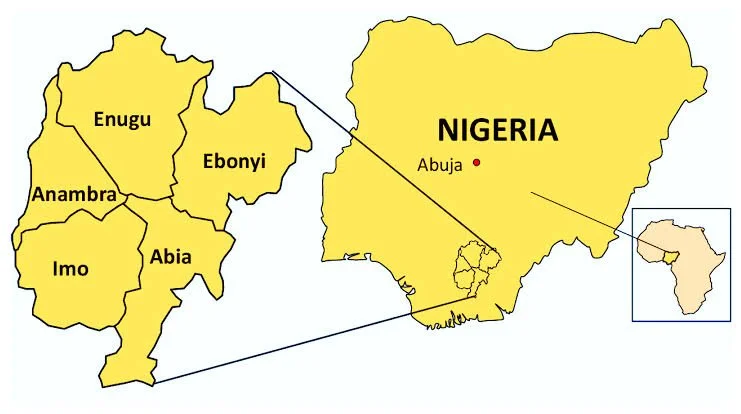discover more
Igbo, a language spoken by millions in Nigeria, has numerous dialects, with estimates ranging from 20 to over 30. These dialects can vary significantly in pronunciation, vocabulary, and even grammar, sometimes making communication between speakers of different dialects challenging.
we are primarily found in the Abia, Anambra, Ebonyi, Enugu, Imo, Northern Delta and Rivers States of Nigeria. Some members of the Igbo ethnic group are found outside Nigeria in countries such as Cameroon, Gabon and Equatorial Guinea. The Igbo ethnic group is one of the biggest ethnic groups in Africa. our population is estimated to be between 35-40 million people (about 15-20% of the Nigerian population).
The Igbo language is a tonal language. Tone varies by dialect, but in most dialects, there seem to be three register tones and three contour tones, with 36 letters in the igbo alphabet language.
igbo dialects
and more to discover
various dialects + regionalities
Achina
Spoken around Achina, Agbudu, Akpo, Amaesi, Umuchu, and Umuomaku. This dialect reflects localized community speech patterns.
Aguleri
Found in Aguleri, Otuocha, Awkuzu, Umunya, and nearby areas. Prominent in the Anambra region, with distinctive phonetic traits.
Anam
Spoken in Anam, Umueze Anam, Nzam, Oroma, and parts of Umuenwelum. Known for tonal shifts and differences from Central Igbo.
Arochukwu
A dialect of the Igbo language spoken in parts of Abia State. Carries unique expressions shaped by Aro history and migration.
Enuani
Spoken in Delta State, parts of Anambra (Onitsha, Obosi), and communities in Imo and Rivers States. Known for being closer to standard Igbo.
Enugwu-Ukwu
Used in Agulu, Nawfia, Nri, and surrounding towns. Its speech reflects cultural heritage central to Igbo history.
Ika
Spoken by the Ika people in Delta and Edo States. A hybrid dialect blending Igbo and Edo features, with growing recognition.
Ikwerre
Spoken in Rivers State. Sometimes considered its own language, but shares deep Igboid roots with distinct vocabulary and intonation.
Isuama
Once widespread and influential, Isuama was used in some early Igbo literature and Bible translations. Though less common now, it remains historically important.
Izi (Izii)
An Igboid dialect cluster spoken in Ebonyi State, closely related to Ezaa, Ikwo, and Mgbo. Often grouped under "Ebonyi dialects."
Ngwa
From Abia State, this dialect is highly idiomatic, with unique pronunciation and a distinct alphabetic system in local texts.
Nsukka
Spoken in and around Nsukka, Enugu State. Known for tonal variations and distinct vocabulary, yet widely intelligible with Central Igbo.
Ogboji
Used in Akpu, Ogboji, Oko, and nearby areas. Represents a sub-regional dialect variation with localized speech patterns.
Okigwe
Spoken in Okigwe, Uturu, and surrounding towns. This dialect stands out for its phonology and intonation differences.
Onitsha
Spoken in Onitsha and surrounding communities. A well-known dialect due to Onitsha’s historic role in commerce and Igbo literature.
Orlu
From Orlu and surrounding parts of Imo State. This dialect is noted for its rhythm and is widely spoken in diaspora communities.
Owerri
Spoken in Owerri and neighboring towns. Known for its fluid tonality and central position in Igbo linguistic studies.
Umuahia
Spoken around Umuahia, Abia State. Recognized for its clear tonal contrasts and cultural richness.
Umunze
Includes Ajali, Isulo, Eziagu, and Umunze communities. Known for cultural depth and distinctive expressions.
Waawa (Wawa Igbo)
Spoken in Enugu and parts of Ebonyi (e.g., Nsukka, Nkanu). A unifying term for northern Igbo dialects, strongly tied to Waawa identity. time with the opportunity to practice in pairs, small groups, and solo exercises
igbo land
at a glance
The Igbo language stretches across southeastern Nigeria, from the banks of the River Niger to the highlands of Nsukka and the coastal plains near Abia and Imo. Each region has shaped its own dialect, influenced by geography, history, and neighboring communities.
This map at a glance highlights the heart of Igbo land and the areas where our major dialects are spoken. From bustling river cities like Onitsha and Asaba, to the cultural hubs of Owerri and Umuahia, to the hills of Afikpo, geography plays a vital role in how our people live, work, and speak.
At Interactive Igbo, we go beyond language to explore the geography, history, and culture that give Igbo its depth and richness. By seeing the land, hearing the stories, and understanding the traditions, learners gain not only words, but also the world that shaped them.

